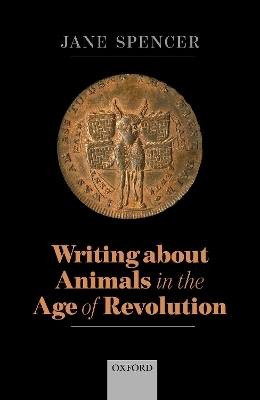
Writing About Animals in the Age of Revolution
Oxford University Press (Verlag)
978-0-19-885751-8 (ISBN)
What did British people in the late eighteenth century think and feel about their relationship to nonhuman animals? This book shows how an appreciation of human-animal similarity and a literature of compassion for animals developed in the same years during which radical thinkers were first basing political demands on the concept of natural and universal human rights. Some people began to conceptualise animal rights as an extension of the rights of man and woman. But because oppressed people had to insist on their own separation from animals in order to claim the right to a full share in human privileges, the relationship between human and animal rights was fraught and complex.
This book examines that relationship in chapters covering the abolition movement, early feminism, and the political reform movement. Donkeys, pigs, apes and many other literary animals became central metaphors within political discourse, fought over in the struggle for rights and freedoms; while at the same time more and more writers became interested in exploring the experiences of animals themselves. We learn how children's writers pioneered narrative techniques for representing animal subjectivity, and how the anti-cruelty campaign of the early 1800s drew on the legacy of 1790s radicalism. Coleridge, Wordsworth, Clare, Southey, Blake, Wollstonecraft, Equiano, Dorothy Kilner, Thomas Spence, Mary Hays, Ignatius Sancho, Anna Letitia Barbauld, John Oswald, John Lawrence, and Thomas Erskine are just a few of the writers considered. Along with other canonical and non-canonical writers of many disciplines, they placed nonhuman animals at the heart of British literature in the age of the French Revolution.
After gaining her BA from Hull and her D.Phil from the University of Oxford, Jane Spencer was an English lecturer for three years in Edinburgh. In 1988 she moved to the University of Exeter, where she is Professor of English. Her current research interests are in animal representation and human-animal relations in the 1660-1830 period. Her books include The Rise of the Woman Novelist (1986), Aphra Behn's Afterlife (2000) and Literary Relations: Kinship and the Canon (2005). With Karen Edwards and Derek Ryan, she is co-editor of Reading Literary Animals: Medieval to Modern (Routledge, 2019).
1: Introduction: Human and animal rights in the eighteenth century
2: Making an ass of yourself in narrative
3: The innovative animals of children's fiction
4: Woman and brute in feminism
5: The orang outing system: animals and abolition
6: Learned pigs: animals and the rights of man
7: The rights of beasts in the early nineteenth century
Conclusion: Rights and stories
| Erscheinungsdatum | 02.01.2020 |
|---|---|
| Zusatzinfo | 6 Illustrations |
| Verlagsort | Oxford |
| Sprache | englisch |
| Maße | 163 x 237 mm |
| Gewicht | 636 g |
| Themenwelt | Geisteswissenschaften ► Sprach- / Literaturwissenschaft ► Anglistik / Amerikanistik |
| Geisteswissenschaften ► Sprach- / Literaturwissenschaft ► Literaturgeschichte | |
| Geisteswissenschaften ► Sprach- / Literaturwissenschaft ► Literaturwissenschaft | |
| Sozialwissenschaften ► Soziologie | |
| ISBN-10 | 0-19-885751-9 / 0198857519 |
| ISBN-13 | 978-0-19-885751-8 / 9780198857518 |
| Zustand | Neuware |
| Informationen gemäß Produktsicherheitsverordnung (GPSR) | |
| Haben Sie eine Frage zum Produkt? |
aus dem Bereich


